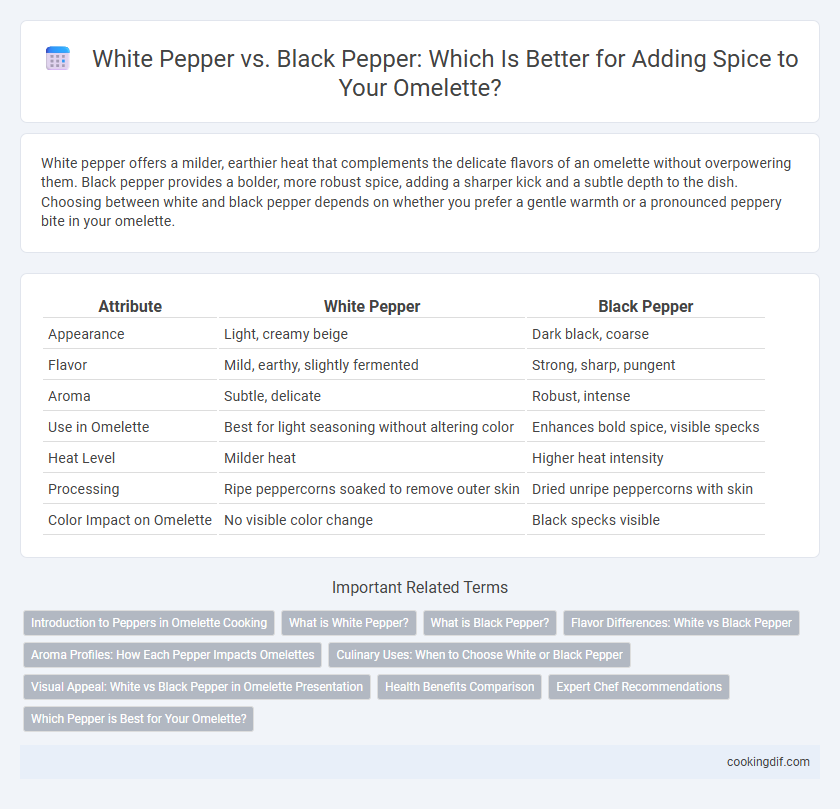White pepper offers a milder, earthier heat that complements the delicate flavors of an omelette without overpowering them. Black pepper provides a bolder, more robust spice, adding a sharper kick and a subtle depth to the dish. Choosing between white and black pepper depends on whether you prefer a gentle warmth or a pronounced peppery bite in your omelette.
Table of Comparison
| Attribute | White Pepper | Black Pepper |
|---|---|---|
| Appearance | Light, creamy beige | Dark black, coarse |
| Flavor | Mild, earthy, slightly fermented | Strong, sharp, pungent |
| Aroma | Subtle, delicate | Robust, intense |
| Use in Omelette | Best for light seasoning without altering color | Enhances bold spice, visible specks |
| Heat Level | Milder heat | Higher heat intensity |
| Processing | Ripe peppercorns soaked to remove outer skin | Dried unripe peppercorns with skin |
| Color Impact on Omelette | No visible color change | Black specks visible |
Introduction to Peppers in Omelette Cooking
White pepper provides a milder, earthier heat that blends smoothly into the creamy texture of an omelette, preserving its delicate flavors. Black pepper, with its sharper, more pungent aroma and robust spiciness, delivers a bold contrast that enhances the egg's richness without overpowering it. Choosing between white and black pepper depends on the desired flavor intensity and visual presentation in omelette cooking.
What is White Pepper?
White pepper, derived from the ripe seeds of the pepper plant (Piper nigrum), offers a milder, earthier heat compared to black pepper, making it ideal for delicate dishes like omelettes where subtle spice is desired. Its processing removes the outer black layer, resulting in a pale, less pungent spice that blends seamlessly without overpowering the dish's flavors. White pepper enhances an omelette's aroma and taste while maintaining visual appeal by avoiding dark specks.
What is Black Pepper?
Black pepper, derived from the dried unripe fruit of the Piper nigrum plant, is a widely used spice known for its robust, pungent flavor and aromatic heat. It contains piperine, a compound responsible for its distinctive spiciness and potential health benefits such as improved digestion and antioxidant properties. In omelettes, black pepper enhances taste with a sharp, earthy bite that contrasts with the milder heat of white pepper.
Flavor Differences: White vs Black Pepper
White pepper delivers a milder, earthier heat with subtle fermented notes, while black pepper offers a bolder, sharper pungency and a complex aroma rich in pine and citrus undertones. In omelettes, white pepper preserves the dish's delicate texture and color without overpowering the eggs, making it ideal for gentle seasoning. Black pepper introduces a robust spice that enhances savory depth but can dominate the subtleties of other ingredients if used excessively.
Aroma Profiles: How Each Pepper Impacts Omelettes
White pepper offers a milder, earthier aroma that enhances omelettes without overpowering their delicate flavors. Black pepper provides a robust, pungent scent with complex notes of pine and citrus, adding a bold kick to the dish. Choosing between white and black pepper depends on whether you want to subtly elevate or distinctly spice the omelette's overall aroma.
Culinary Uses: When to Choose White or Black Pepper
White pepper offers a milder, slightly earthy flavor that blends smoothly in creamy dishes like omelettes, preserving their light color and subtle taste. Black pepper delivers a robust, pungent heat that enhances the overall spiciness and complexity of the omelette's flavor profile. Chefs select white pepper for delicate, pale dishes where appearance and subtlety matter, while black pepper suits hearty, bold-flavored omelettes needing a sharp, aromatic kick.
Visual Appeal: White vs Black Pepper in Omelette Presentation
White pepper enhances an omelette's visual appeal by maintaining a smooth, uniform yellow surface without dark specks, offering a clean and refined presentation. Black pepper adds a contrasting texture with its distinct dark flecks, creating a rustic and visually dynamic appearance that highlights the seasoning. Choosing between white and black pepper depends on whether a subtle, elegant look or a bold, textured finish is preferred in omelette presentation.
Health Benefits Comparison
White pepper contains piperine, which enhances digestion and possesses anti-inflammatory properties, making it beneficial for gastrointestinal health when added to an omelette. Black pepper is richer in antioxidants and contains higher levels of volatile oils that support immune function and may improve metabolic activities. Both peppers offer distinct health benefits, with black pepper providing stronger antimicrobial effects while white pepper tends to be milder and less likely to irritate sensitive stomachs.
Expert Chef Recommendations
Expert chefs often recommend white pepper over black pepper for omelettes due to its milder, earthier flavor that complements eggs without overpowering them. White pepper's subtle heat integrates seamlessly into delicate dishes, enhancing taste while maintaining the omelette's smooth texture. Black pepper, with its sharper and more robust profile, is typically reserved for heartier breakfast dishes where a bold spice presence is desired.
Which Pepper is Best for Your Omelette?
White pepper offers a milder, earthier flavor that blends smoothly into the creamy texture of an omelette without overpowering other ingredients. Black pepper delivers a sharper, more pungent spice that enhances the overall taste with a bold kick, perfect for those who prefer a robust seasoning. Choosing between white and black pepper depends on whether you want subtle seasoning or a more pronounced peppery heat in your omelette.
White Pepper vs Black Pepper for spice Infographic

 cookingdif.com
cookingdif.com